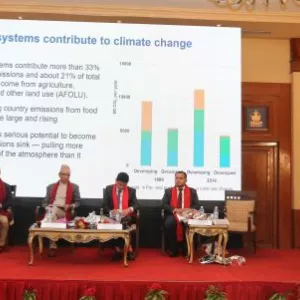Global Food Policy Report 2022 Nepal launch: Accelerating innovation and investments to transform food systems
Global Food Policy Report 2022 Nepal launch: Accelerating innovation and investments to transform food systems by Rebika Laishram OPEN ACCESS | CC-BY-4.0 Climate change poses a growing threat to efforts to build sustainable food systems. The COVID-19 pandemic and the current Ukraine crisis have further exacerbated global food and nutrition insecurity, leading to significant increases in poverty, hunger, and malnutrition.

Global Food Policy Report 2022 Nepal launch: Accelerating innovation and investments to transform food systems
Global Food Policy Report 2022 Nepal launch: Accelerating innovation and investments to transform food systems
Climate change poses a growing threat to efforts to build sustainable food systems. The COVID-19 pandemic and the current Ukraine crisis have further exacerbated global food and nutrition insecurity, leading to significant increases in poverty, hunger, and malnutrition. A July 18 launch event for IFPRI’s 2022 Global Food Policy Report (GFPR) in Kathmandu, Nepal, explored the potential for more effective policies and programs focused on climate impacts and food systems. The launch was co-sponsored by the Institute for Integrated Development Studies (IIDS) and the South Asian Association for Regional Cooperation (SAARC).
“Our policies and regulations must accelerate innovation, reset market incentives and increase the overall financing to meet the sustainable food systems,” said IIDS Chair Swarnim Wagle. “In Nepal, the issues highlighted in the report have the potential to increase the richness of our policy discourse on how we adapt these global learnings and messages to our national context.”

